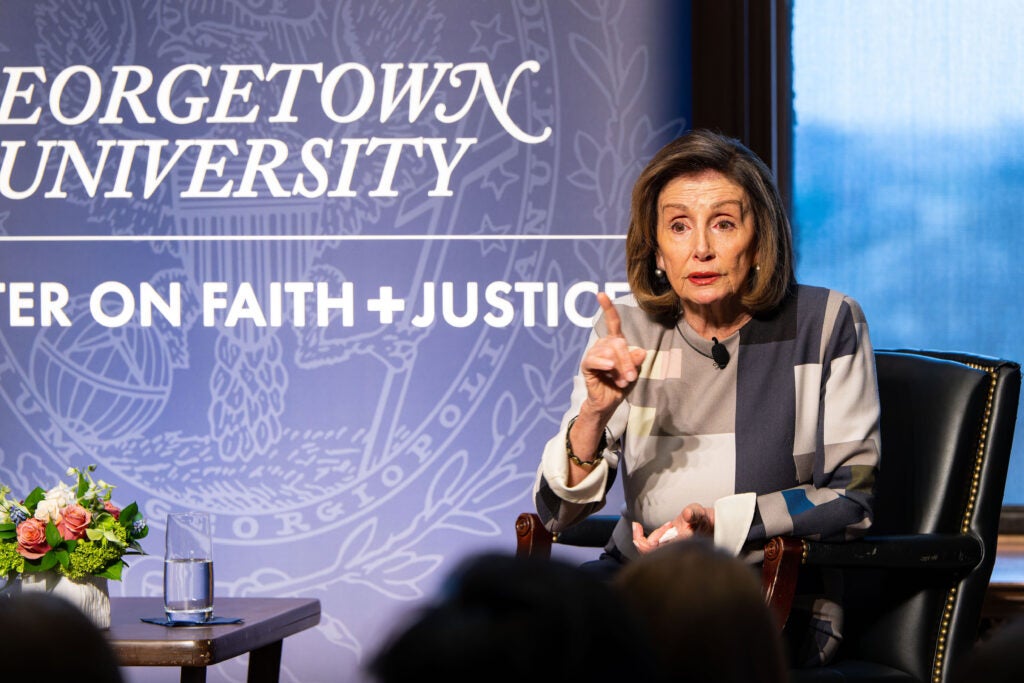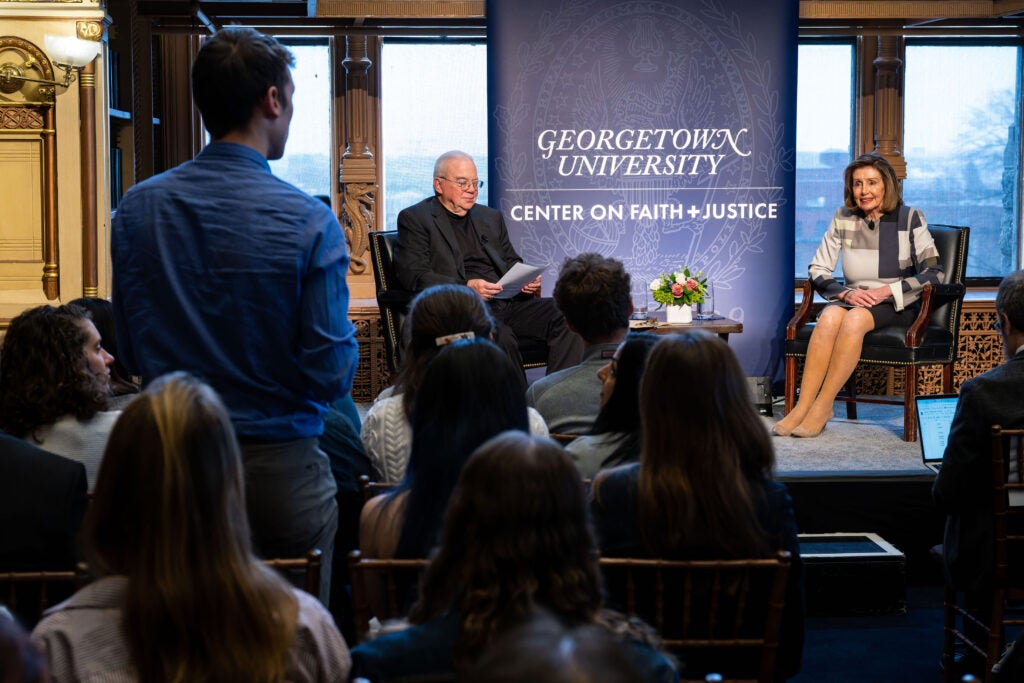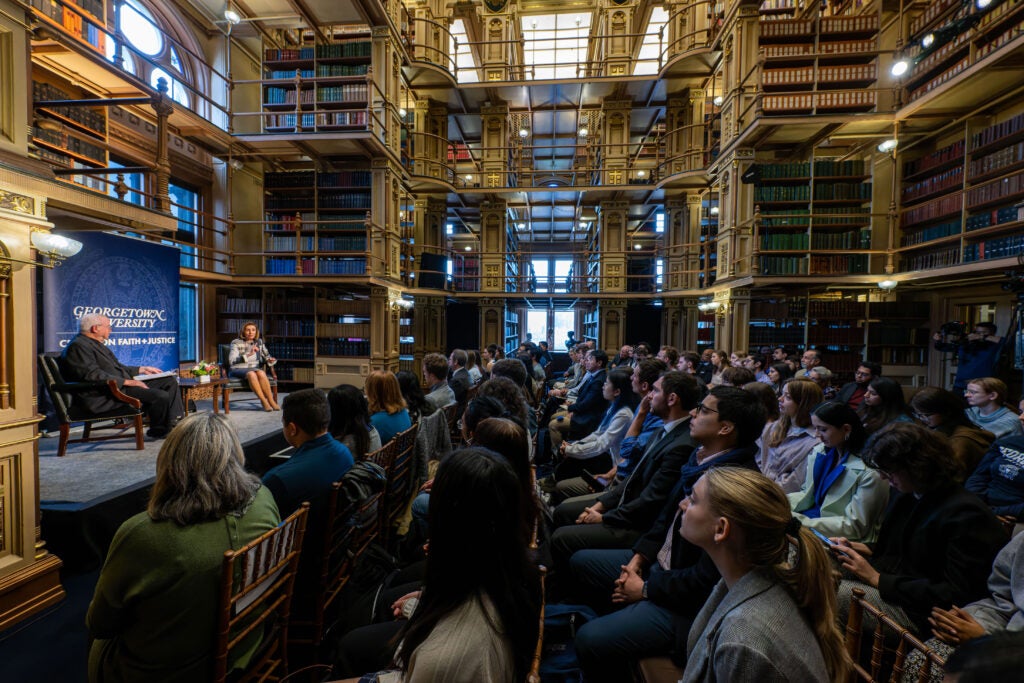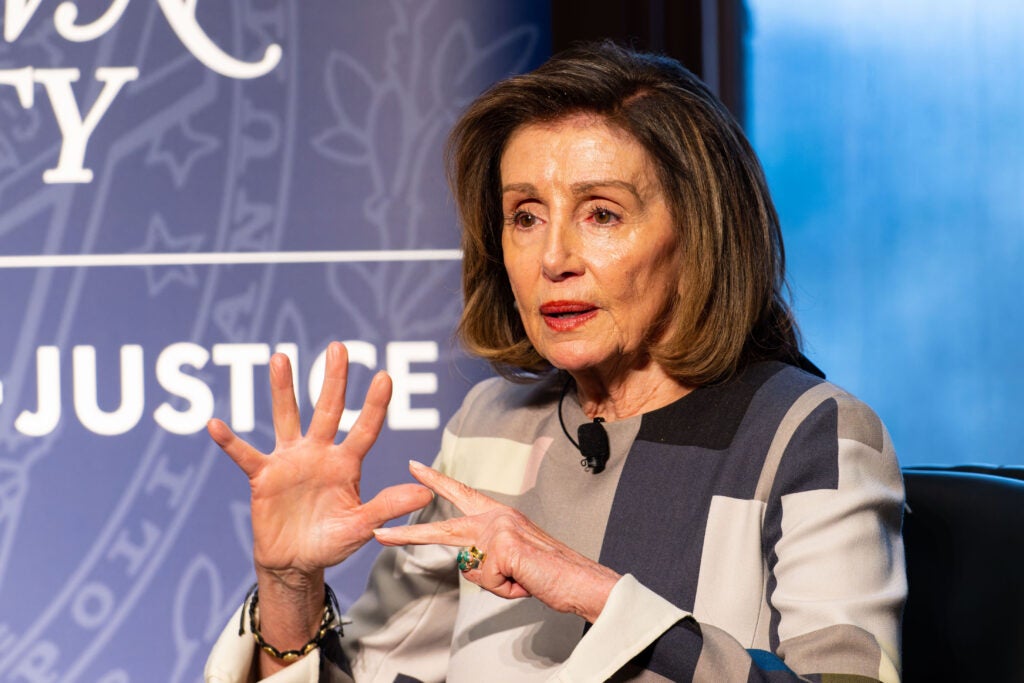Nancy Pelosi’s Advice to Georgetown Students: Know Your ‘Why’

Photo by: Phil Humnicky/Georgetown University.
Former Speaker of the House Nancy Pelosi spoke about her Catholic faith and how Catholicism has shaped her political career and priorities in a candid and intimate conversation with students, faculty and staff at Georgetown on March 23.
Pelosi was the inaugural speaker in a new series hosted by Georgetown’s Center on Faith and Justice that brings political leaders to the Hilltop to engage in conversations about the role of religion and ethics in their public and personal lives.
Titled “Higher Calling,” the wide-ranging conversation was moderated by the Rev. Jim Wallis, founding director of the Center on Faith and Justice and the inaugural chair in Faith and Justice at the McCourt School of Public Policy. As Georgetown students seek their own vocations, Wallis called Pelosi, the first woman Speaker of the House of Representatives in U.S. history, the perfect person to launch the series.
“I have been in so many meetings with you over the years — political meetings — in which you have cited the Gospel of Matthew to make moral arguments,” Wallis said, later adding, “You have been successful because you have been faithful.”
Welcomed by President John J. DeGioia, who noted Pelosi’s deep Georgetown ties — her husband, Paul, and three of their children are alumni — the California congresswoman spoke about the connections between her Catholic faith and her decision to first run for office 35 years ago.
“When I talk to members of Congress, I always encourage them to know their ‘why.’ Why are they doing this? Because that justifies all the pain that goes with it,” Pelosi told the students, faculty and community members crowded into Riggs Library. “My ‘why’ is that one in five children in America lives in poverty, goes to sleep hungry … That’s what took me from the kitchen to the Congress, from housewife to House Speaker.”
Pelosi also spoke about being raised in a Catholic home in Baltimore, her advocacy on behalf of human rights in China and her long allyship with the Dalai Lama, the Tibetan Buddhist leader. She encouraged Georgetown students – especially women – to serve in politics and claim their seat at the table. “And we want you at the head of the table, right Mr. President?” she said with a wink to DeGioia.

Photo by: Phil Humnicky/Georgetown Univ
When she was elected to Congress in 1987, just 23 of the 435 members of the House of Representatives were women, Pelosi said. “I made a decision, right then and there. We have to make a change.” Thirty-six years later, a record 28% of the current 118th Congress – 128 Representatives and 25 Senators – are women.
“I would say to the women, don’t let them – whoever ‘they’ are – be daunting to you. You have something very valuable to contribute that is very necessary. We always say: when women succeed, America succeeds. And you could apply that to every culture, country and society in the world.”
Kira Akka-Seidel (MSFS’24), a constituent of Pelosi’s California district and a graduate student in the School of Foreign Service, said the “Higher Calling” conversation rejuvenated her passion for helping climate refugees – and offered an opportunity to get career advice from the most powerful woman ever to serve in U.S. politics.
When there are so many people who need help, Akka-Seidel asked Pelosi, how does she choose which challenges to take on. In a detailed, 10-minute answer, Pelosi said effective public service entails having a vision that blends knowledge, judgment and strategy. That is, knowing what you want to do, why you want to do it and how to get it done.
“But that’s all in your head,” she told Akka-Seidel. “What people want to know most of all is what’s in your heart. What are you most passionate about?”
After the event, Akka-Seidel said she hadn’t planned on asking a question, but decided to when she heard Pelosi speak about the deep role Catholicism plays in shaping her political priorities.
“It was a really special moment,” Akka-Seidel said, “especially because of its intimacy. It’s rare that you get to see such a significant figure in such a small space. This is really the reason I chose Georgetown in the first place, because it fosters these kinds of dialogues.”

Photo by: Phil Humnicky/Georgetown Univ
The Center on Faith and Justice was launched in November 2021 under the direction of Wallis, founder of Sojourners, the Christian nonprofit and magazine, and since then, has promoted engagement with issues from voting rights and gun control to child poverty and the war in Ukraine.
As part of their work, Center leaders have convened gatherings with religious leaders and members of Congress, helped to lead a campaign across 10 states to protect voting rights during the 2022 elections, and launched a summer program to bring seminarians to Washington, DC, to engage lawmakers and one another in conversations about advancing the common good.
The Center plans to host one “Higher Calling” conversation each semester, with the goal of helping students form their consciences and seek their vocations.

Photo by: Phil Humnicky/Georgetown Univ